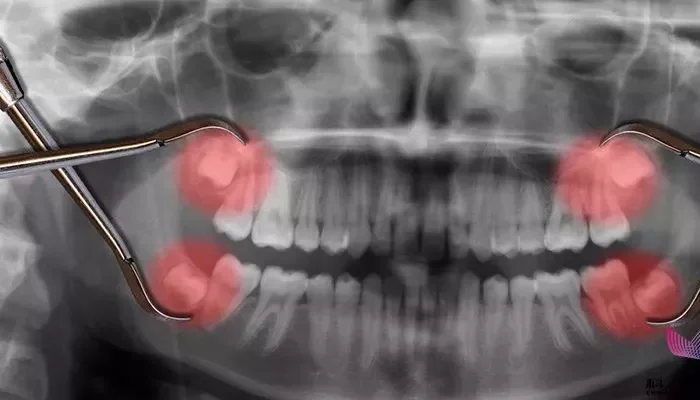Wisdom teeth are the last teeth to grow in the human mouth and are the largest teeth in the human mouth. Wisdom teeth usually develop between the ages of 18-25, but some people may develop wisdom teeth at an earlier or later age. Wisdom teeth usually have four, one at the back of the upper and lower jaw.
Typical Age Range for Wisdom Teeth to Erupt
The eruption of wisdom teeth is a gradual process that usually occurs in the late teenage years or early adulthood. Most people will begin to see their wisdom teeth coming in between the ages of 17 and 25. This age range can vary widely, however, with some individuals experiencing earlier or later eruption.
Here’s a general timeline of when wisdom teeth typically emerge:
Age 17 to 21: This is the most common age range for wisdom teeth to begin to erupt. Some individuals may see their first wisdom tooth start to emerge at the lower jaw at this stage.
Age 21 to 25: For many people, all four wisdom teeth (one in each quadrant of the mouth) will come in during these years.
Age 25 and beyond: In some cases, wisdom teeth may not emerge until after age 25 or not emerge at all. There are instances where people may have impacted wisdom teeth that do not break through the gumline.
Factors That Influence the Timing of Wisdom Teeth Eruption
The timing of wisdom teeth eruption can be influenced by a variety of factors. Understanding these factors can help explain why some people’s wisdom teeth come in earlier or later than others.
1. Genetics
Your genetic makeup plays a significant role in determining when your wisdom teeth will erupt, how many you’ll have, and whether they will emerge fully or remain impacted. If your parents had their wisdom teeth come in early or had them removed, there’s a good chance you will experience similar patterns.
2. Jaw Size and Space
In modern humans, our jaws tend to be smaller compared to our ancestors. If there’s not enough room in the jaw, wisdom teeth may become impacted, meaning they are unable to fully emerge from the gums. This can lead to problems such as pain, swelling, or infection. The available space in the jaw can thus influence when wisdom teeth appear or whether they cause issues.
3. Overall Health
General health and nutrition can also impact the eruption of wisdom teeth. If there are issues like malnutrition or underlying medical conditions that affect tooth development, it might delay or prevent the eruption of wisdom teeth.
4. Gender
There is some evidence to suggest that females tend to experience wisdom teeth eruption earlier than males. The process of tooth eruption is often complete in females by the early twenties, while males might experience it slightly later, often in their mid-twenties.
Effect of Wisdom Tooth Growth
The growth of wisdom teeth may have the following effects on oral health:
1. Crowding: The growth of wisdom teeth can lead to crowding of other teeth, which can affect oral health.
2. Jaw pain: The growth of wisdom teeth may cause jaw pain and discomfort, which can affect oral health.
3. Tooth displacement: The growth of wisdom teeth may cause the displacement of surrounding teeth, which can affect oral health.
4. Dental caries and periodontal disease: The growth of wisdom teeth can lead to areas that are difficult to clean, which increases the risk of dental caries and periodontal disease.
Treatment of Wisdom Teeth
If the growth of wisdom teeth has an impact on oral health, then it may need to be treated. Here’s how to deal with wisdom teeth:
1. Wisdom teeth removal: If the growth of wisdom teeth is having an effect on oral health, then wisdom teeth may need to be removed. Removal of wisdom teeth is a common dental procedure that can be performed under local or general anesthesia. Removing wisdom teeth can prevent problems such as crowding, jaw pain, tooth displacement, dental caries, and periodontal disease.
2. Monitor wisdom teeth: If the growth of wisdom teeth is not having an impact on oral health, it may be necessary to monitor the growth of wisdom teeth regularly. Regular checkups can ensure that wisdom teeth are not affecting your oral health. If the growth of wisdom teeth has an effect on oral health, then wisdom teeth may need to be removed.
3. Orthodontic: If the growth of wisdom teeth causes other teeth to crowd or shift, then orthodontic treatment may be needed. Corrective treatment can be done with braces or other devices. Corrective treatment can prevent problems such as crowding, jaw pain, tooth displacement, dental caries and periodontal disease.
4. Oral hygiene: Oral hygiene is very important to prevent wisdom tooth problems. Regular brushing, flossing, gargling and regular checkups can prevent dental caries, periodontal disease and other oral problems.
Conclusion
Wisdom teeth are the last teeth to grow in the human mouth, usually between the ages of 18 and 25. The growth time of wisdom teeth varies from person to person, but it is generally believed that the growth of wisdom teeth is related to genetics. The growth of wisdom teeth can have an impact on oral health, including problems with crowding, jaw pain, tooth displacement, dental caries, and periodontal disease. If the growth of wisdom teeth has an impact on oral health, then treatment may be required, including removal, monitoring, and orthodontic teeth. Regular checkups can ensure that wisdom teeth are not affecting your oral health. Oral hygiene is very important to prevent wisdom tooth problems.
Related topics:

